Election impact?published at 20:44 GMT 18 March 2015
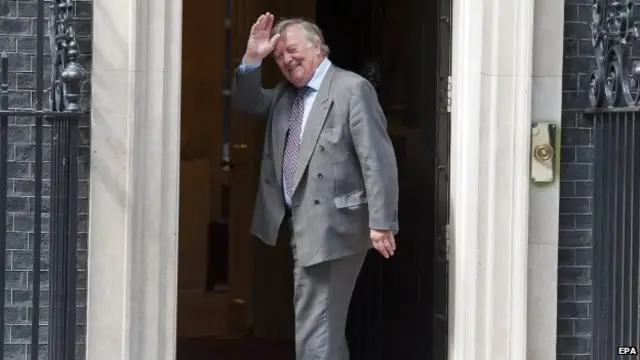 Image source, EPA
Image source, EPA"Budgets never affect elections," former Conservative Chancellor Ken Clarke tells Sky News, before adding that George Osborne's was a good one today.
George Osborne presents the 2015 budget
2015 UK growth revised up to 2.5% by OBR
Chancellor pledges to end austerity by 2019/20
Tax free allowance to go up to £10,800 next year
New personal savings allowance for first £1,000 interest
Labour leader says chancellor has 'failed working families'
Pippa Simm and Sarah Weaver
 Image source, EPA
Image source, EPA"Budgets never affect elections," former Conservative Chancellor Ken Clarke tells Sky News, before adding that George Osborne's was a good one today.
 Image source, Reuters
Image source, ReutersIf you're just joining us, here's a quick recap of today's events:
Chancellor George Osborne delivered his sixth and final Budget of this Parliament, with 50 days to go until the general election
He announced tax cuts for first-time home buyers, workers and savers and declared that Britain was "walking tall again"
Ed Miliband said it was a Budget that people "won't believe" from a government "they do not trust"
Earlier in the day, David Cameron and Mr Miliband clashed over the NHS at Prime Minister's Questions - likely to be the penultimate encounter before the election
Unemployment has fallen again, by 102,000 to 1.86 million in the three months to January.
tweets, external: on chances of minority govt ken clarke tells @SkyNewsBreak 'its the duty of the electorate' to 'put upon strong government' ie vote
tweets, external: looks like @TheSunNewspaper - unsurprisingly - heading towards endorsing @Conservatives if you're listening to @StigAbell on @SkyNewsBreak
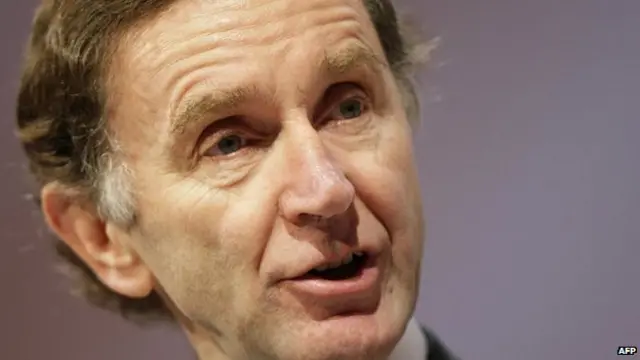 Image source, AFP
Image source, AFPChannel 4 News has tracked down former trade minister and HSBC boss Lord Green to a church in the City of London - where he was giving a lecture. Pressed on allegations that HSBC helped customers of its Swiss banking arm to avoid tax, he said the claims were a "source of dismay and deep regret". "Did we work hard to try and do the right thing. Yes we did," he told Channel 4's Alex Thompson. "Did we get everything right. Maybe not?"
 BBC News Channel
BBC News Channel
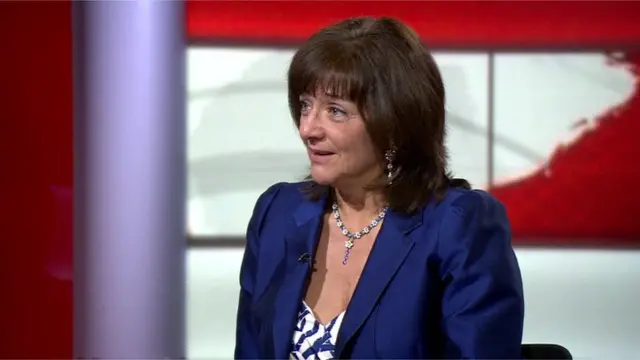
Pensions expert Ros Altmann has welcomed the government consultation into making it compulsory for pensioners to take professional advice before selling their annuities. Discussing the proposal on the BBC News Channel, she said the risk of overcharging was "why we need advice for people and we need the regulator to be on top of this."
She continued: "The idea that we shouldn't trust people with their own money - which is how it used to be - I think, needed to change."
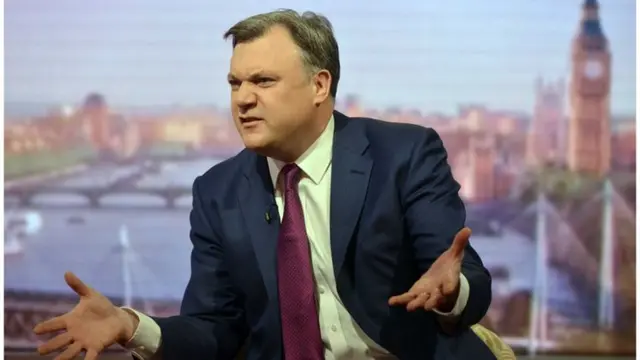
George Eaton's Staggers blog reports, external how Ed Balls seized on a Tory Treasury defence of the level of cuts to spending on day-to-day services planned in the coming years.
At his post-Budget briefing, the shadow chancellor claimed spending was back to 1938 levels, but midway through his briefing the Tory Treasury twitter account tweeted, external: "not true - OBR text makes clear it's 1964".
When made aware of the tweet, the shadow chancellor apparently scoffed: "Is that a boast?" before adding: "If I was George Osborne I would have said: 'Don't press send'".
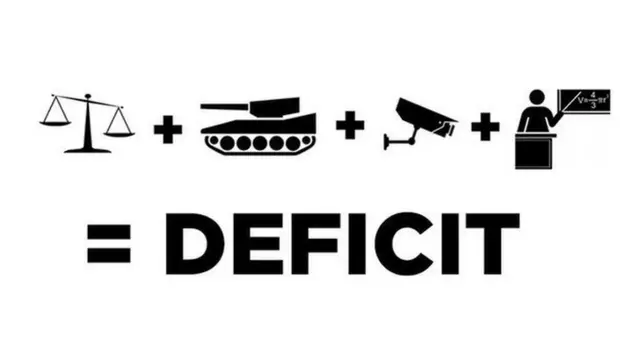 Image source, Robert Colvile / Clipartbest.com / BuzzFeed
Image source, Robert Colvile / Clipartbest.com / BuzzFeedBuzzfeed's Robert Colvile has summarised the future pressures on public spending. His analysis, external describes how "the cuts - whichever party wins the election - will be felt in much the same areas, squeezing public services that have already been squeezed still further," before concluding: "Despite Osborne's upbeat rhetoric, we should all be bracing ourselves for the cuts to come."
 Linda Yueh
Linda Yueh
Chief business correspondent
Investors don't like to be surprised, so part of what the Fed has to do is to manage expectations. And one of the concerns that's percolating right now is whether Fed raising rates or tightening could result in a repeat of the 1930's." Read more of Linda analysis of today's Fed statement here.
 Robert Peston
Robert Peston
Economics editor

For Robert Peston, the Budget hasn't changed the choice facing the nation's voters. The BBC's economics editor writes: "George Osborne has lamed - if not shot - one of Labour's foxes, namely that Tory spending cuts would be egregiously larger than Labour's.
But he continues: "The choice confronting voters hasn't changed much as a result of this Budget: more spending on public services with Labour (and to a lesser extent with the Liberal Democrats); faster debt reduction with the Tories."
 Channel 4
Channel 4
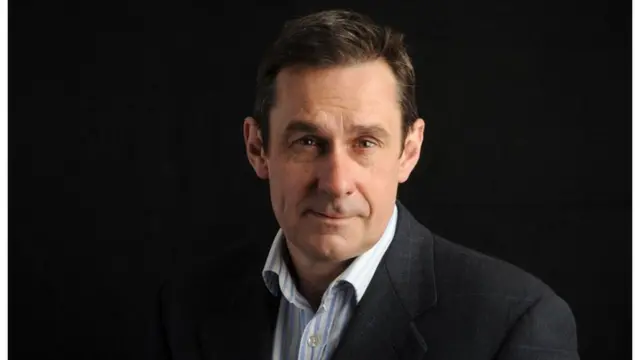
Channel 4 News economics editor Paul Mason says he thought George Osborne had "simply blinked" when confronted with "the scale of austerity" promised in December's autumn statement and "realised it wasn't going to be that popular."
Asked whether any triumphalism over today's Budget was justified, Mr Mason says the chancellor has halved the deficit "without chaos and catastrophe" but pointed out that, in doing so, Mr Osborne had only achieved what Alistair Darling said Labour were going to do - criticised at the time by the Conservatives as not going far enough. He concludes that "if anyone gets a flypast it should be the Governor of the Bank of England and possibly that half a million migrants who came to this country and boosted the workforce and boosted the growth".
Energy stocks led the gains on Wall Street as the price of oil spiked sharply after the Fed's statement. Lower rates tend to make oil a more attractive investment. The energy sector in the S&P 500 jumped 3.1%. The S&P was up 1.13%, while the Dow Jones was 1.17% ahead.
George Osborne didn't deliver the game-changer the Conservatives need, opines George Eaton over at the New Statesman, external. He said the budget neutralised some of Labour's strongest attack lines, namely on the scale of public spending cuts, but there was no "knock-out blow".
"After a raft of articles proclaiming that this could be the day the election was decided, the Tories' task looks little easier than it did this morning," he adds.
 BBC News Channel
BBC News Channel
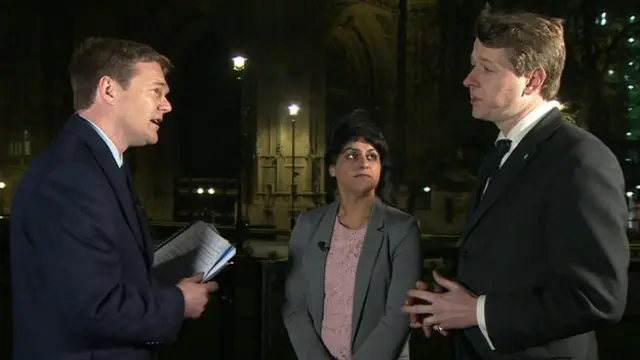
Conservative MP Robin Walker says the budget was about "delivery on a plan", with growth and jobs up and the deficit and debt down, rather than any rabbits in the hat. He welcomes the message of economic credibility over Labour's "chaos".
But shadow Treasury minister Shabana Mahmood says ordinary people have paid the price for the government's "economic failure" and claims the Conservatives are planning "very deep" spending cuts in the next parliament.
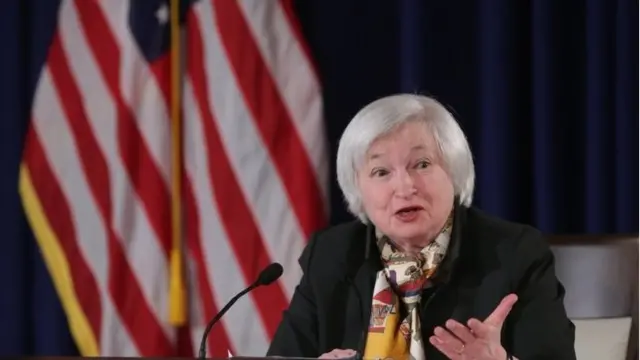 Image source, Getty Images
Image source, Getty ImagesDespite the Fed's cautious comments on growth and exports, Janet Yellen says today's statement is not a "weak forecast". She tells a press conference: "Taking everything into account, we continue to project above trend growth. So we do see considerable underlying strength in the US economy. And despite what looks like a weaker first quarter, we are projecting good performance for the economy."
George Osborne should be delighted so many people are lining up to criticise his policies - it disguises the fact he doesn't have any, writes Dr Craig Berry, deputy director of Sheffield Political Economy Research Institute (SPERI). In an article for the Left Foot Forward blog, external, he says the measures announced by the chancellor were designed to "curry favour" among his own supporters and "take the sting" out of Labour attack lines. But, he adds, Mr Osborne has "continued to play fast and loose with the British economy, refusing to address or even intensifying the kind of problems that caused the financial crisis and subsequent severe recession".
Market strategist David Joy, of Ameriprise Financial, in Boston, says the word "patient" was becoming a restriction on the Fed. "I applaud the Fed's actions today. By eliminating "patient" from its guidance it removed an artificial stricture on its flexibility, creating room for the data to dictate its future actions."

This was the chancellor's least exciting budget - and none the worse for it, writes Paul Goodman for ConservativeHome, external. Instead of Osborne the hare, we today got Osborne the tortoise. His gambit is to try to grind his way to victory. We will know soon enough whether it works, he adds.
The Fed's decision to end its "patient" approach to when interest rates might rise should not be misinterpreted, says the central bank chair Janet Yellen. "Just because we removed the word patient from the statement doesn't mean we're going to be impatient." It's unlikely that comment will settle the debate, though.
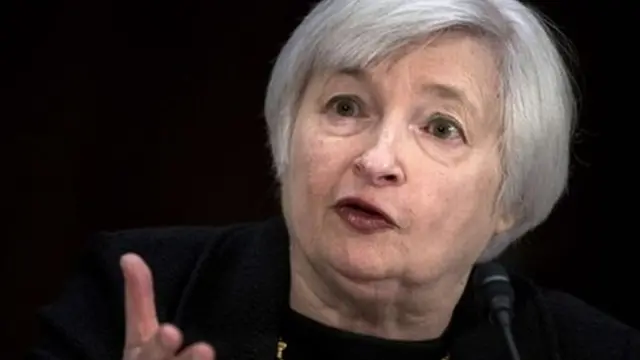 Image source, AFP
Image source, AFPFed chair Janet Yellen says she wants to "emphasise again, that today's modification of the forward guidance should not be read as indicating that the Committee has decided on the timing of the initial increase in the target range for the Federal funds rate. In particular, this change does not mean that an increase will necessarily occur in June. Although we can't rule that out."